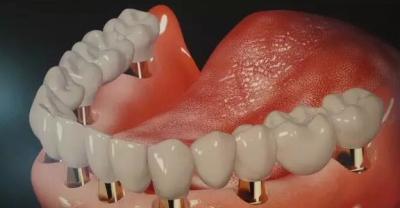Advantages and disadvantages of dental implants (yarbeija science popularization)
Implant refers to a method of missing tooth restoration, which is based on the lower structure of the implanted bone tissue to support and secure the upper dental restoration. It includes two parts: the lower supporting implant (dentalimplant) and the upper dental restoration (dental prosthesis, implant-supported).
It uses artificial materials (such as metal, ceramic, etc.) to make implants (generally similar to the root shape of teeth), implanted into the tissue (usually the upper jaw) by surgical methods, and obtain firm retention support of the bone tissue. Through special devices and ways to connect to support the upper dental restoration.
The function, structure and aesthetic effect of dental implants are very similar to those of natural teeth.
Others have complete teeth, which is often the envy of people with missing teeth. Because of the lack of teeth, chewing food is very difficult, after the mechanical properties of chewing teeth become weak, unable to chew food well, it will cause inexplicable digestive system diseases and stomachache. Friends with missing teeth can now achieve complete teeth through dental implant technology. But there are always pros and cons. What are the advantages and disadvantages of dental implants?
one。 Benefits of dental implants:
1. Can hinder the resorption of alveolar bone.
Alveolar bone resorption does not often occur when there are teeth, but after tooth loss, alveolar bone resorption occurs quickly and the jaw bone shrinks significantly. At this time, making dentures will put a burden on alveolar bones. Compared with those without dentures, about 20% of alveolar bones are absorbed faster, dentures must be replaced every few years, and it is difficult to live longer than 5 years. On the contrary, artificial implants can strengthen the bone around the alveolar bone, reduce resorption, and maintain the alveolar bone.
two。 No damage to other teeth.
In a dental filling operation like bypass surgery, two healthy teeth on both sides of the teeth must be scraped off, and these two teeth have to share the burden with the fallen tooth, thus reducing the lifespan of the teeth. The same goes for dentures, which can also cause damage when hooked on the rest of the teeth. However, artificial dental implants are carried out independently, so they will not adversely affect the surrounding teeth.
3. Restore the chewing force.
If the maximum chewing power of healthy natural teeth is 100, the chewing force of some dentures is 15-20, that of complete dentures is 10-15, and that of implants is 80-90.
4. Restore the taste of chewing.
We can feel the taste when we eat because the teeth grow in the alveolar bones. When using dentures, the dentures are placed on the gums and the chewing force is reduced so that it is difficult to feel the taste. Artificial implants are implanted in the alveolar bone, which is not as good as natural teeth, but you can feel the taste of chewing.
5. There is less damage to the gums.
Gingivitis and other phenomena often occur in the use of dentures, but the use of artificial implants will reduce this risk.
6. No foreign body sensation.
The denture itself carries metal, which can pass through the upper palate or lower gums, causing a foreign body sensation, but the artificial implant is planted in the alveolar bone and basically has no foreign body sensation.
7. Can maintain the connection between teeth, so that people have a complete dentition.
Because the broken teeth can damage the height of the connection between the teeth. If you use dentures on the gums, because the gums are not hard enough, the gums will collapse over time, disrupting the balance between the whole connection.
8. It won't cover the organization.
Dentures can cover the gums for structural reasons, but artificial implants will not, but can correctly feel the temperature and texture of the food.
9. Maintain a natural and beautiful appearance.
When using dentures, the lips protrude outward, and the muscle movement will be restricted, making the expression unnatural. If the dentures are pulled out, the lips will be sunken in again. But artificial implants, like natural teeth, are planted in the alveolar bone and can maintain their natural appearance.
two。 Disadvantages of dental implants:
1. Gingivitis: it is caused by poor oral hygiene and plaque stimulation. Therefore, we should have good oral hygiene habits after operation.
2. Proliferative gingivitis: the gingival tissue covers or clings to the joint of the implant abutment and the porcelain crown, resulting in poor local hygiene and proliferative inflammation of the gingival tissue.
3. Fistula formation: the fistula on the mucosa is associated with inflammation around the abutment or implant. It often occurs in the cases where the gingival tissue covers the abutment and bridge junction; surgical treatment can be taken.
4. Progressive marginal bone resorption: peri-implant bone resorption caused by local inflammation or implant overload and central bolt fracture. Removal of plaque, aiming at etiological treatment.
My friends in Changchun, Jilin Province can come to me for dental care. There is a discount!
- Prev

Price range of dental implants in Dongguan
The price range of dental implants in Dongguan? At present, many people with missing teeth will choose to do implant teeth, the sex-to-price ratio of implant teeth is high, and the effect is also very good. A lot of people want to know.
- Next

What are the advantages and disadvantages of dental implants?
Dental implants are called the third teeth of human beings. it is a method for the treatment of missing teeth. in today's extensive commercial promotion of dental implants, what are implant teeth?
Related
- Fuxing push coffee new agricultural production and marketing class: lack of small-scale processing plants
- Jujube rice field leisure farm deep ploughing Yilan for five years to create a space for organic food and play
- Nongyu Farm-A trial of organic papaya for brave women with advanced technology
- Four points for attention in the prevention and control of diseases and insect pests of edible fungi
- How to add nutrient solution to Edible Fungi
- Is there any good way to control edible fungus mites?
- Open Inoculation Technology of Edible Fungi
- Is there any clever way to use fertilizer for edible fungus in winter?
- What agents are used to kill the pathogens of edible fungi in the mushroom shed?
- Rapid drying of Edible Fungi

